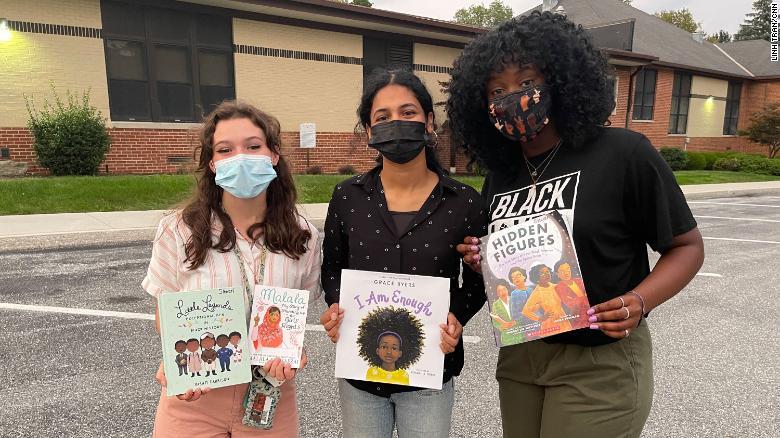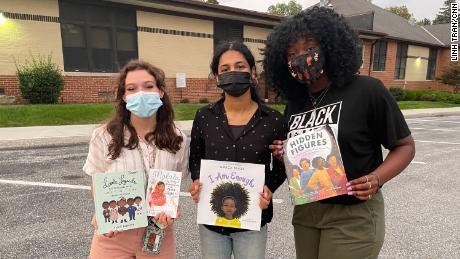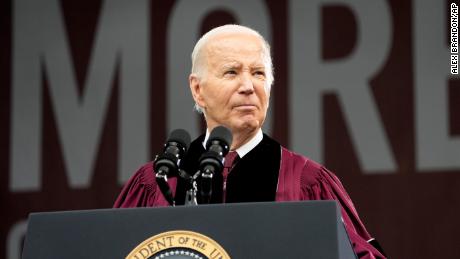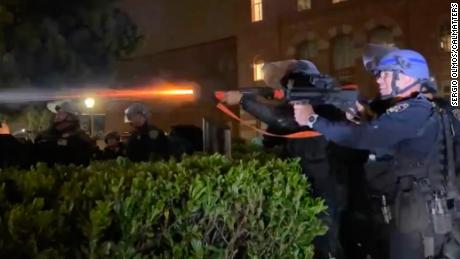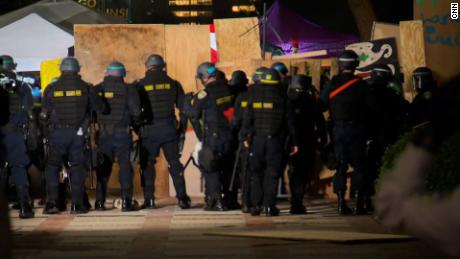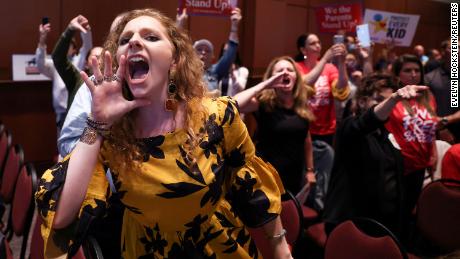York, Pennsylvania (CNN)Students in a southern Pennsylvania school district are battling the latest example of panic spreading over how history and race are taught in schools across the US.
"I don't think a moral compass will let you ban books about equality and loving each other," Central York High School senior Christina Ellis told CNN.
Ellis is among the students protesting a book ban in York, Pennsylvania, and questions whether the officials who decided to remove certain reading materials from the curriculum even read the resources they deem controversial. She was joined by other teens protesting in front of Central York High School this week.
On Monday, students, parents and other community members debated during a virtual school board meeting about the list of anti-racism books and resources that were banned from the curriculum by the Central York school board last year.
Last October, the all-White school board unanimously banned a list of educational resources that included a children's book about Rosa Parks, Malala Yousafzai's autobiography and CNN's Sesame Street town hall on racism.
From chaotic school board meetings to political strife along party lines, debates about diverse curriculum have ignited controversy across the country in recent months. And earlier this month, a new Texas law aimed at restricting discussions of race and history in schools had some educators second guessing themselves and forgoing civics-related activities to avoid running afoul of it.
But in York, discussions about race erupted in the wake of last summer's protests and students started having more conversations about racism and creating more inclusive environments.
School officials say it's not a ban, and the materials are "frozen" while the board vets the material. But that process has taken nearly a year. At the virtual board meeting on Monday, district leaders said the materials are still prohibited.
Some students and their parents said it's frustrating and questioned the logic of a school board that they say isn't diverse and doesn't address the concerns of a multicultural student body.
A senior at Central York High School, Edha Gupta, said the book ban, "was a slap in the face."
"This is a board that after hearing their students' concerns about diversity in the district, hearing my struggle with race, being an Indian American and consistently feeling like I didn't belong. After all those conversations for weeks on end, they still pursued the book ban."
Gupta isn't the only student angry with the board.
"I was deeply hurt when I heard about this book ban, which hurts Black and brown authors and resources," said Ellis, a Black senior, at the high school.
She said the books are crucial to teaching students about racism.
"Why is a Sesame Street episode threatening the education of children. If anything this school board is threatening education," she said during the meeting.
School librarians have pulled books from shelves, and teachers say their lesson plans have been impacted.
"I have to now, with this resource ban, think twice about whether or not I should or could use a James Baldwin quote as an opening for my class," said Ben Hodge, a teacher at Central York High School.
There's also some fear among educators.
"There are teachers looking over their shoulders wondering if someone's going to be at their door darkening their door, saying you said something or you mentioned something or used something that you were not supposed to," said Patricia Jackson, who has taught in the Central York School District for more than 20 years.
The fact that all the banned materials are by or about people of color is just a coincidence, according to Jane Johnson, the school board president.
"Concerns were based on the content of the resources, not the author or topic...," she said in a statement.
What do the parents say
"I don't think that a board that lacks diversity is the appropriate authority to determine what qualifies as appropriate material to address race in this community," said Brandi Miller, a parent of a student in the school district.
However, other parents were supportive of the ban.
One mother said,"the community is 100% against an critical race theory indoctrination agenda," during Monday's meeting. "Schools are not the place for politics or identity to be shaped."
But critical race theory is not taught in K-12 curriculum.
"This is very clearly an attack on diversity, equity (and) inclusion. It very much feels like a political overreach based on misinformation," Ana Ram├│n, deputy director of advocacy at the Intercultural Development Research Association, told CNN earlier this month.
York parent Matt Weyant commended the school board for implementing the ban.
"I don't want my daughter growing up feeling guilty because she's White," he said.
That sentiment is spreading across the US. A growing number of states have passed or are considering policies strictly defining what students are allowed to learn about race.
But it's the students who are missing out say former and current students.
During the board meeting, a man who said he was alumnus of the school district, said that unless the school board can go through each book on the ban and explain what's so "abhorrent," about each of them, then the books should be allowed back into the school's curriculum.
"I want to learn genuine history," said Olivia Pituch, a student who was protesting in front of Central York High School this week.
"I don't want to learn a White-washed version. I want to hear all of it. I don't want everyone to be worried about how we feel because no one was worried about how BIPOC members of the community felt."
But one expert said this ban is different from many of the other debates across the country.
"This seems pretty egregious. I can see how certain trainings or workshops that some parents take exception to seem really outside of what a history class can be expected to do," said Natalia Mehlman Petrzela, an associate professor of history at the New School. "But the kind of texts that are being banned here make me feel that there is now just sort of an allergy to anything that mentions race or racism."
This is about more than a book, or a movie, or even a curriculum, veteran teachers argue. In York, they worry it's a war on their profession.
"I am not an enemy of the state. I am here to take care of your babies when they walk into my classroom and there are some I'm looking up at them, but they're still babies," Jackson, the York teacher, said.
